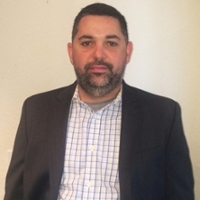Principal Scientist, Medtronic; Former Postdoc, Departments of Pharmacology & Neurology; 2008-2012

Interview By Jack Heath, PhD
Postdoctoral Fellow, Dept. of Biomedical Engineering
Can you briefly describe your role as principal scientist at Medtronic?
In my current
On the other hand, there are a lot of internal business meetings, talking about strategy, goals for the year, budgets, and competition, all of which are a big part of
Another novel aspect of the job is the regulatory environment. This is something you may not deal with directly in a pre-clinical lab at a university, but even in pre-clinical work in the company, we have to think about good laboratory practices (GLP). If we are going to try to make a product, we need to follow strict scientific and documentation procedures for submitting data to the FDA. I don’t often work directly on GLP studies, but I am still always thinking about how the outcomes of my studies may apply to downstream GLP work. In supporting clinical work, we have to be very aware of the corporate, local, federal and global regulations, which are governed by various bodies including the FDA and local IRBs. So the regulatory aspect of the job is another major factor in the daily workings of the company.
What made you decide to move into
I was on the academic track—that’s what I had been preparing for, for a long time. I spent a lot of time as a
However, another contributing fact in my decision was that, even if funding was solid, the academic track is really an “individual sport.” It’s your small business. That can be exciting but I really grew into wanting to be part of a team. It’s not something that I had considered until I got further along, but I realized that it had become a strong driver in my career path.
How did you get into your current position?
I got lucky. Fortunately, I had a network of people from my academic research career that forwarded me an email chain describing an open position for someone with expertise in movement disorders and animal models, which was exactly my niche. It was really a dream job. I wrote emails that very day to HR and the hiring manager.
Another major factor was the in-person interview. It was not expected to give an academic job talk. In my case, it needed to have a very translational overtone, and also demonstrate my ability to work on clinical studies, with which I didn’t have much experience. One of the most common scenarios that we experience when interviewing potential candidates is when they fail to read the situation and instead give a traditional academic job talk. It’s important to know your audience and remember that there will be many non-scientists in the room, including marketing and clinical functions.
Another major aspect of my preparation was that I studied behavioral interview questions. HR departments generate these questions that seem simple, but if you haven’t thought them through beforehand may be tricky. For example, “Tell us about a time you were working with somebody and had to solve a conflict…” These are mostly about determining whether you are a team player, flexible, etc. Because of my preparation, I was ready for these questions when asked.
It’s also important to be aware that throughout the job selection process, many things happen behind the scenes that affect your candidacy. The job position or
Do you have any advice for postdocs considering careers in the biotech and pharmaceutical industry? What can they do to make themselves competitive?
It’s all about being prepared. I never forgot a conversation I had with one of my former graduate school lab mates regarding her move to industry. She said, “Everybody says, maybe I’ll just go into industry.” These were wise words because this can be insulting if you walk into an interview with the idea that this company or these people are your second-choice or fallback plan. It’s an easy tell in the industry environment and you won’t get the job.
So a
Probably the most important thing for me was preparing my resume. Academics are all taught to compile CV’s, which can look like laundry lists to a corporate HR person. That’s not what you should submit for an industry job opening. A resume needs to be a clean and clear story of your package or brand. An HR person may literally spend less than a minute looking at your resume. So if your resume looks like a
How did your post-doc experience at Emory prepare you for your position today?
Working in
Did you use any of the resources at Emory, such as the Office of Postdoctoral Education, the Postdoctoral Association or others?
Honestly, when I was at Emory my sense was that the career development services offered were more geared towards the traditional academic track. So during my time at Emory, I attended alumni seminars on a personal journey into
Do you have any advice for post-docs considering careers in industry?
Beyond the preparation above, I would say that networking is key, though this does not necessarily mean collecting “likes” or “connections” on Facebook or LinkedIn. I do see junior colleagues trying to make connections this way, which is probably not going to be that successful when it comes to finding a job. In my opinion, successful networking is organic. I encourage post-docs to seek opportunities and interactions with industry, including internships or collaborative projects. Anything to get your foot in the door and become a known quantity will be a huge advantage. To do so you will obviously need
This interview was published

